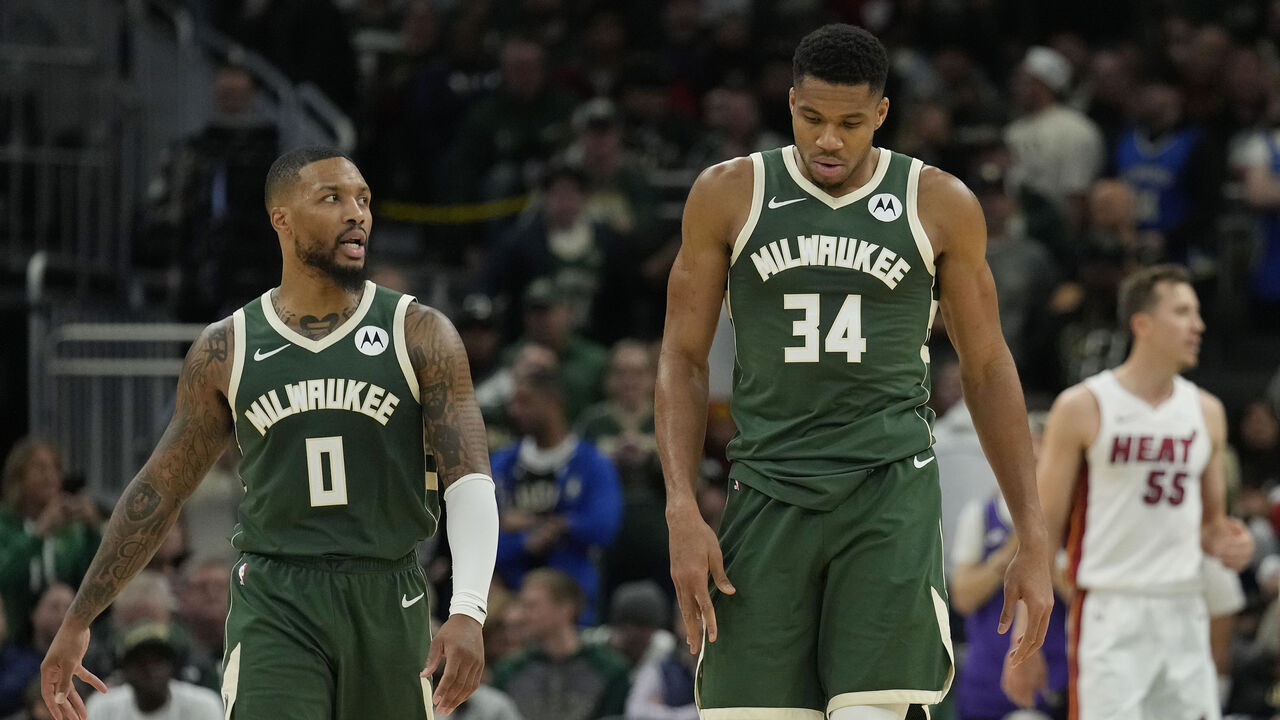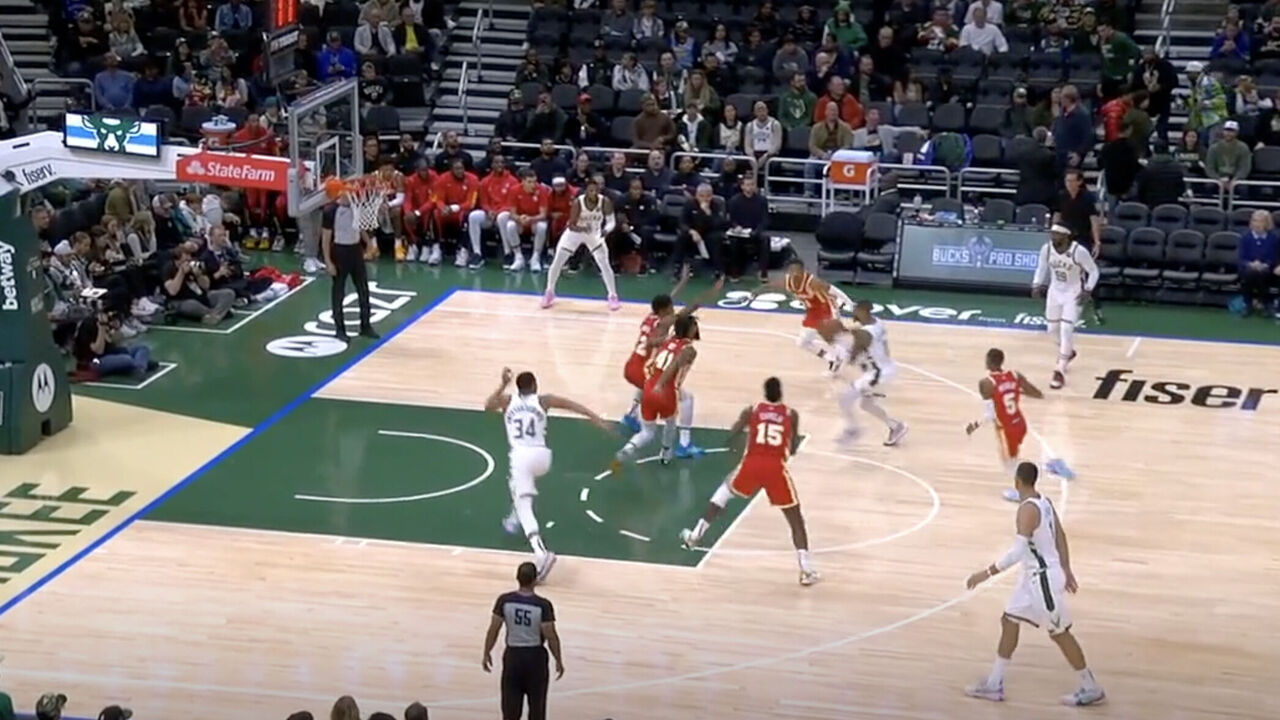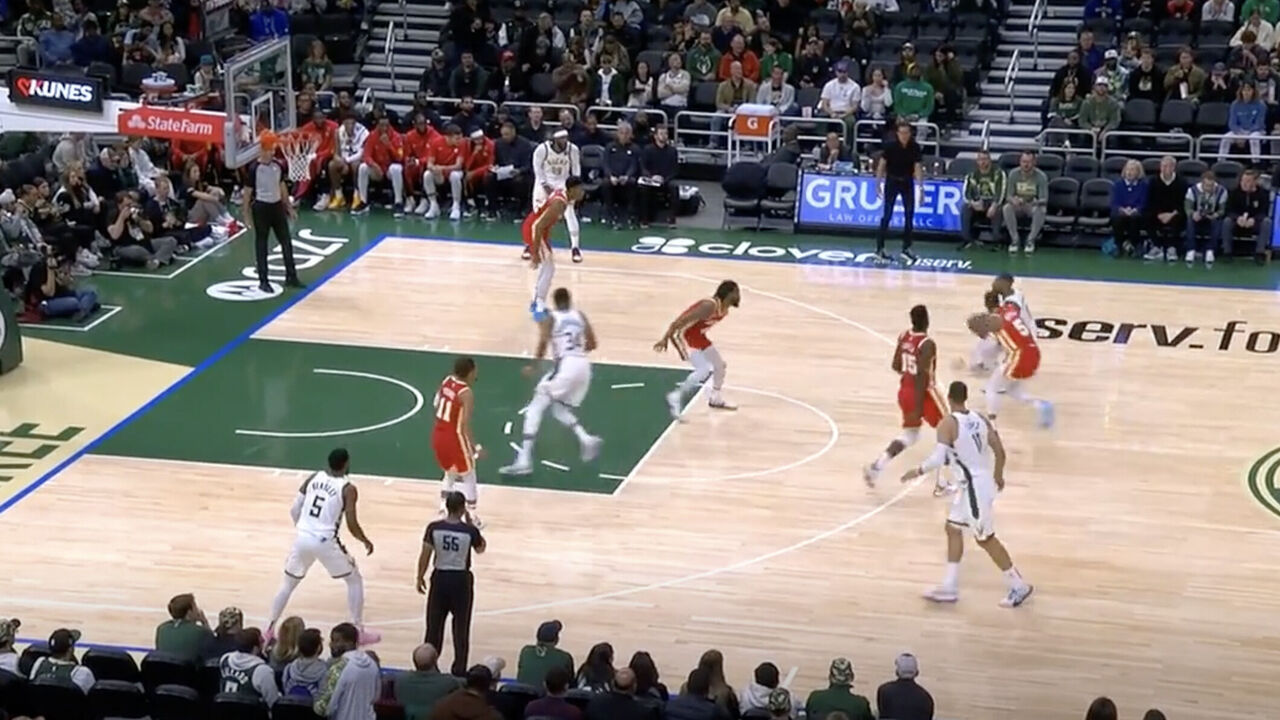What's holding back the Dame-Giannis 2-man game?
We knew coming into this season that the Milwaukee Bucks’ identity was going to change, and that the winningest team of the last half-decade would have to succeed in a completely different way than it did previously. The Bucks were accustomed to dominating defensively while eking out just enough offense to allow their defining strength to carry the day. But by effectively swapping Jrue Holiday for Damian Lillard before training camp, they set themselves up to do the opposite: bury teams under an offensive avalanche while (hopefully) defending well enough to keep their own heads out of the snow.
It was an easy case to make. Milwaukee was forging a yin-yang of superstars with minimal skill overlap, two players who attract as much defensive attention as anyone in basketball from their respective danger zones (Giannis Antetokounmpo in the paint, Lillard beyond the arc). The Bucks had always found offensive success in the half court when they allowed Antetokounmpo to lean into his big-man skill set – diving and cutting and finishing above the rim – rather than asking him to initiate possession after possession from the top of the floor. Now they had one of the greatest pull-up shooters and pick-and-roll ball-handlers of all time to facilitate that role for him. It felt like one of the most intuitive fits in the league.
That may yet bear out, but six games into the season the Bucks’ defense has suffered more pain than expected, and their offense hasn’t necessarily looked like a salve. Their record is a respectable 4-2, but they have a minus-5.6 net rating outside of garbage time, and their wins haven’t looked nearly as good as their losses have looked bad.
I’m going to leave the defensive problems for another day and instead focus on the offensive end because that’s where this iteration of the team will butter its bread. More specifically, I want to look at the state of the Lillard-Antetokounmpo two-man game because it’s supposed to be the staple food of this would-be offensive powerhouse.
Milwaukee ranks 11th in offensive rating, and while that isn’t bad in a vacuum – the team finished 15th last year and won 58 games – it isn’t good enough considering expectations and the fact its defense is likely to remain an issue. What’s more, far from propping that pedestrian offense up, the minutes with both Lillard and Antetokounmpo on the floor are actually dragging it down. The Bucks are scoring a meager 103.1 points per 100 possessions when the two share the court, fewer than the league-worst Trail Blazers have managed so far. Yikes.

The season is obviously still extremely young, so we don’t have to jump to any sweeping conclusions. But that doesn’t mean we shouldn’t investigate what isn’t working for an all-in team that’s much closer to the end of its contending runway than the beginning. It’s troubling that two weeks into the season we’ve hardly even seen flashes of the deadly Dame-Giannis pick-and-roll we expected. Antetokounmpo has set just 52 ball screens for Lillard (which ranks 44th among all NBA pairings) and the Bucks have scored 0.88 points per possession on those trips, according to a source with access to Second Spectrum data. They’ve run only nine dribble-handoffs (69th) and created only five points out of them. For now, the value of their two-man game remains entirely theoretical.
Lillard is spending a lot of time away from the ball in general, and a big chunk of the half-court offense is still comprised of Giannis-initiated action. (Lillard’s 25.5 front-court touches and 6.3 minutes of possession per game are down from 37.4 and 7.6 last season, and almost identical to Holiday’s numbers with the Bucks.)
Some pullback was to be expected given the caliber of Lillard’s new co-star, but de-emphasizing his on-ball creation to this extent feels unnecessary, especially considering Khris Middleton is currently playing only 18 minutes a night while recovering from a knee injury. And it’s not like Milwaukee’s running any inverted action when Antetokounmpo is on the ball; Lillard’s screened for him only three times so far.
For as infrequently as they’ve broken it out, we do have some data points that can help us understand what happens when Lillard and Antetokounmpo interact, especially in a pick-and-roll. It’s clear, for example, that one thing opposing teams are willing to concede when defending that action is a catch-and-shoot three from just about anyone else on the floor off a skip pass or short-roll kickout. Defenses have been especially willing to give Brook Lopez those looks, though that has a lot to do with the size and help capabilities of the players who guard him.
If Lopez is spotting up in the corner, his defender will happily stray off of him in order to tag Antetokounmpo early. And when the Bucks station Lopez above the break instead, the defense will often just swap assignments, shifting a wing or even a guard onto Lopez while the center stays low, ostensibly guarding the weak-side corner but really just staying in early help position to meet Antetokounmpo on the roll.
Loading up to stop Antetokounmpo from rolling all the way to the basket has been the biggest priority for opposing defenses, even more than taking away Lillard’s pull-ups. Too often, defenses have been able to do both; showing high against Lillard and forcing him to give the ball up without getting burned on the back side. Out of those 52 ball screens Antetokounmpo has set for Lillard, he’s attempted only six shots as a roller. He’s scored on five of them, but none of those buckets has come especially easily. I’ve watched them all, and every single one of them has required him to finish over or around a low helper. (He got one dunk, after getting one of those low men to bite on a pass fake.)
To be blunt, Antetokounmpo is not dealing particularly well with the aggressive tags he’s seeing. He’s failing to download the floor fast enough to hit the open man on the perimeter or in the dunker spot before the defense recovers. He’s careening into help at the rim and often getting stripped. It’s been more common for him to turn the ball over on his rolls than to make a pass that leads to a bucket.
Watching him struggle so badly in those scenarios is a good reminder that 4-on-3 passing takes a lot of reps to master, and Antetokounmpo has very few of those reps under his belt. He simply doesn’t have a lot of experience setting 20-30 ball screens a game. And the times when he’s been used as a roll man in the past, it’s primarily been as a finisher sneaking behind drop coverage. For all his playmaking growth over the years, most of that growth has come in transition, out of the triple threat, or with his back to the basket. There’s a completely different art to catching on the short roll, making instantaneous reads, and changing the direction of the ball on the move.
It’s also important to note where those catches are happening. The Bucks, like the Blazers before them, set ball screens for Lillard well above the 3-point line. Doing so gives Lillard ample space to waltz into pull-up threes or rev up for drives when the screen defender drops back, or gives Lillard’s screener ample space to make a play with a man advantage when the defense puts two on the ball. For now, though, Antetokounmpo is much more comfortable catching the ball closer to the hoop.
That’s a big reason (on top of the benefits of familiarity) that the Middleton-Antetokounmpo pick-and-roll has actually been the far more effective action so far, producing a ridiculous 1.37 points per possession. Those two have run 22 pick-and-rolls together, and 13 of them have been initiated inside the arc, according to my Second Spectrum source. By comparison, only two of Antetokounmpo’s 52 ball screens for Lillard have been set below the 3-point line. This isn’t to suggest the Bucks need to reorient the geography of those actions, but it’s probably going to take Antetokounmpo some time to get his bearings within them.
Lillard hasn’t struggled individually to the same extent (he’s scoring 1.09 points per possession when he shoots out of a pick-and-roll with Antetokounmpo), but it’s clearly been an adjustment for him as well. He’s used to playing with a ground-bound short roller in Jusuf Nurkic, and doesn’t have much experience playing with a rim-running lob threat. As such, he’s missing some golden opportunities to feed Antetokounmpo for dunks.
On this play, he passed the ball to Malik Beasley in the strong-side corner:

On this one, he hoisted a step-back three:

All told, Lillard’s assisted on eight of Antetokounmpo’s baskets, which is tied for 77th among assist combos in the league, per PBP Stats.
“The hard part is just staying patient,” Lillard told The Athletic’s Eric Nehm after an ugly loss in Toronto last week. “I think we’ve all been around long enough to understand that it’s a process and it’s going to take time, but I don’t think that makes it any easier.
“It’s one thing to understand it in walk-throughs and in practice,” he added, “but to go out there when another team is trying to disrupt it and to be able to make reads … it’s a different challenge.”
A lot of those reads will undeniably get smoother over time, but more than anything the Bucks need to clean up their overall offensive decision-making. As mentioned, when Antetokounmpo has been the ball-handler, Lillard’s hardly screened for him. Instead, he’s run a confusing amount of 4-5 pick-and-roll with Lopez and Bobby Portis, which are screens that most teams will feel fine going under or switching. The Bucks could attack those switches by immediately flowing into a Dame-Giannis action that pulls the opposing center out to the 3-point line, but they never do. Instead, those plays typically end with Giannis hoisting a pull-up three or trying to attacking a sagging big:
Throwaway possessions like that were frustratingly common before, but they’re especially enervating when Damian freaking Lillard is on the court.
That doesn’t mean it’s all been bad. If anything, the fact the Bucks have manufactured the league’s 11th-best offense without developing any real synergy between their two best players feels encouraging. This beautiful crunch-time connection against the Knicks in Friday’s In-Season Tournament contest hinted at how much fertile soil can be tilled with their DHO game:
They’ve had success running Lillard-Lopez pick-and-rolls/pops, with Antetokounmpo as a threat to cut from the wing or finish in the dunker spot when his defender rotates or gaps off of him. They’ve dabbled in double-drags with Lopez popping and Antetokounmpo slipping to the rim (both lob opportunities cited earlier came out of that set.)
They have one action that works like gangbusters for Lillard almost every time, where they give him a ball screen on either side near midcourt, initiating it so early that opponents can’t pre-switch and are left with no size on the back end:
So, Milwaukee is exploring myriad options. Not always elegantly, but seemingly with the goal of establishing a more diversified offensive portfolio before winnowing things down and honing in on their two superstars. Lillard’s touch time has crept up in recent games, as has Antetokounmpo’s volume of ball-screening. It’s as likely as not that these struggles will be a distant memory by midseason.
At the same time, there are some red flags here that can’t be entirely dismissed, and all of this is worth keeping an eye on moving forward.

